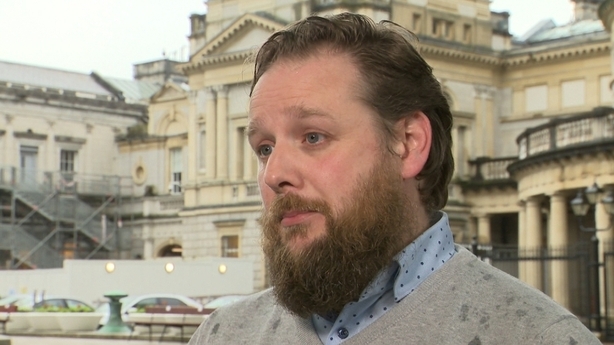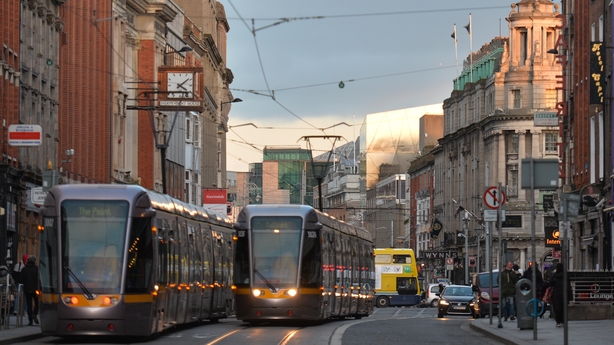A plan that could see armed gardaí deployed in Dublin city centre if required has been described as "wholly disproportionate and draconian" by a Government TD.
The plan for high-visibility policing in the city, which was announced by An Garda Síochána this morning, involves an increase in garda overtime and the deployment of specialist units.
The units will include the air support unit, the mounted unit, the dog unit, regional armed response units and road policing units.
It follows a number of high-profile incidents in the city.
Gardaí also said there will be planned days in the city centre that will involve checkpoints, intelligence-led searches and arrests, immigration checks and enforcement of road traffic offences.
An Garda Síochána said it has started using the overtime funding of €10 million with 20% of it allocated for additional public order patrolling in the city centre.
However, Green Party TD Patrick Costello has called on Garda Commissioner Drew Harris to "reconsider this policing plan and put a more appropriate plan in place".

Mr Costello said that "more gardaí on the beat" are required to address the issues, but he added that the use of armed gardaí is "simply excessive".
"That the commissioner has jumped to using armed gardaí begs the question is there enough regular frontline Gardaí to do the job, or is this the commissioner over-compensating for previous inaction," Mr Costello said.
Minister for Justice Helen McEntee announced the extra funding last month following concerns over violence in Dublin city centre.
Gardaí said they will deliver more than 16,500 additional policing hours per month in the city centre to help tackle antisocial behaviour and street drug dealing.
Around €2m of the funds will be dedicated to increasing deployment of the public order unit on a daily basis, promising "an enhanced visible garda presence at strategic locations in Dublin city centre such as main thoroughfares and the Liffey Boardwalk".
Gardaí said this will be replicated across the other divisions in the Dublin Metropolitan Region (DMR).
They added there have been over 1,500 arrests across Dublin between 28 July, when the funding was announced, and 20 August.
Ms McEntee welcomed the announcement by gardaí.
The minister said: "While policing alone cannot solve many of the factors which contribute to criminality or people feeling unsafe, high-visibility policing is crucial to providing reassurance for all who live in, work in or visit our capital city."
"The overall objective of our activity is to reassure the citizens, visitors and the business community that Dublin is a safe place in which to live, visit, and work. An enhanced visible policing presence is central to this objective," said Assistant Commissioner with the DMR Angela Willis.
Need to 'build confidence' - Daly
Sinn Féin's spokesperson on justice Pa Daly said the extra resources are required but they "must address concerns and build confidence".
He said: "I would sound a note of caution in relation to some aspects of the proposed changes. It is crucial that we get this important issue right. We need more details about the deployment of public order and armed response units.
"This must be a short-term response. Policing requires the faith and co-operation of the communities being policed."
Fianna Fáil TD Jim O'Callaghan said that additional policing measures will "act as a deterrent" to people involved in criminality in the area.
Speaking to RTÉ’s Drivetime, Mr O’Callaghan said: "I think it (plan) indicates government’s commitment to funding the police force, particularly in the capital city."

He said: "I think this (increased) visibility will improve the situation. It's not going to solve every problem.
"Some of the sources of this problem are drug addiction and that’s much more complex than simply a policing solution. "
"But part of the solution must be to ensure that we see greater numbers of gardaí around the city centre.
Rise in number of tourists seeking help dealing with crime
The plan comes as there has been an increase in the number of tourists seeking help dealing with crime in Ireland.
The figures released by the Irish Tourist Assistance Service (ITAS) follow a number of violent incidents in Dublin involving visitors to the country.
ITAS offers a range of assistance to tourists who have experienced trauma or crime while visiting the state.
ITAS CEO Lisa Kennedy said there has been an increase in the number of people they have been helping, compared to 2019, before the pandemic.
We need your consent to load this rte-player contentWe use rte-player to manage extra content that can set cookies on your device and collect data about your activity. Please review their details and accept them to load the content.Manage Preferences
So far this year they have helped 782 tourists, compared to 721 in the same period in 2019.
"While not a huge increase, it has increased and the increase we have noticed is in the area of thefts where tourists are the targets of opportunistic thefts in the [Dublin] city centre," she said.
Ms Kennedy said it could be situations where a bag is stolen which contains a wallet and documents including a passport.
"This can be very distressing for them and we offer assistance and practical support, cancelling cards and contacting embassies".
She said: "Our aim is to get them back to enjoying their holiday and restore confidence in Ireland being a safe country to visit."







